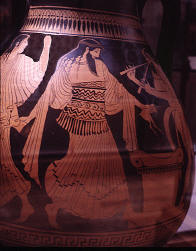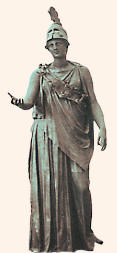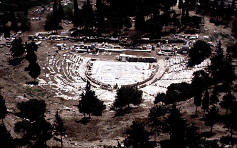Sophrosyne: "self-control"; self-mastery; measure
Sophronein: "understanding"
Sparagmos: the act of devouring; the Eucharistic
experience
Daimon: divine power
Sylleptor: partner
Theos: force
Pneumos: spirit or "soul"
Mythos: story
Logos: story (the distinction between these two has been debated since long before Plato--they are interchangeable for "story": but is mythos a local tale and logos a more universal, or elevated plot? Mythos certainly refers to performance of speech. Myths, however, are never neutral but always have some point in the context in which they are told, and thus in principle demand an answer.
Orchestra: "dancing floor": flat, circular space either fifty or ninety-feet across where the chorus danced.
Skene: literally, "stage"; a wooden "shack" for changing costumes having three doors. Actors would also appear on top of the skene (our word is now "scene").
Oikos: house, as in family--the "House of Atreus"
Ananke: fate as necessity
Moira: fate that is given by personality; literally "share" (from the "spoils of war")
Onkos: headdress for the actors
Buskins: boots for actors, elevating their stature by as much as twelve inches or more.
Faculty psychology: how the soul was diagrammed from the time of Plato: Nous (spirit)/Will and Understanding/Appetite; the three had to be in balance or madness was the result. This equates to "humours" in Elizabethan times, and Freud's tripartite division of the psyche: Id/Ego/Super-ego.
Chthonian deities: the oldest gods of the earth; gods of the dead, of the Earth (for instance, the Erinyes--the "Furies"--who sprang from the blood of Heaven when Cronos wounded him)
 Olympic deities: descended from the birds; sons
and daughters of Heaven
Olympic deities: descended from the birds; sons
and daughters of Heaven
Hamartia: "missing the mark"; the closest idea to "sin" or error--an error in judgment (from an archery term)
Tragoidia: "song delivered at the sacrifice of a goat"; tragis oide: "goat song"; perhaps the derivation of the word "tragedy" (were goats awarded as prizes? does this refer to the ritualistic slaughter of the sacrificial animal? the scream that the goat makes when slaughtered?)
Anagnorisis: "recognition": one of the two requirements, as given by Aristotle in the Poetics for a "complex plot."
Peripeteia: "turn" or "reversal": the other necessity, of two, for a complex plot
Hybris ("hubris"): excessive pride
Timē: honor
Metabolow: change
Palintonos harmonia: "harmony of opposites"; dramatic device used by Euripides
Hypothesis: "plot summary"
Ate: "bewilderment"
Atain: "uncontrollable passion"
Agon: "contest"
Amoibaion "antiphonal exchange" between
chorus and actor
Aition: "account of the origin of a phenomenon"
Ekkyklema: "stage trolley"
Dithyramb: choral poetry, as opposed to the choral song: the choral song undoubtedly developed out of the dithyramb
Deus ex machina: "god from the machine"; suspended from the geranos or mechane, the god would appear; this is more than a literal term: it suggests an abrupt ending--a sudden resolution--dictated by an intervening god; Euripides was notorious for its use, as in the Medea
Elpis: "hope"
Choral Terms:
choregos: "manager" of the chorus
parodos: "entrance song"; entrance from the side: a song delivered by the chorus as it enters and files into the orchestra
stasimon: "standing song": a song while the chorus is dancing in the orchestra (the parados and stasima in effect divide the play into discrete sections: prologue (the part of a tragedy before the chorus enters), episodes (the part of a tragedy between choral songs), and exodos (the part of a tragedy following the last choral song).
strophe: part of the tripartite form of the Greek choral interlude, which the chorus chanted; the first movement of the chorus while turning from one side of the orchestra to the other; the part of a choral ode sung while this movement is executed.
antistrophe: the second part of the choral interlude; moving in the reverse direction from the strophe; the part of the choral ode sung while this move is executed.
epode: the third part of the choral interlude; a different metrical structure that was chanted while standing still.
episode: an ode spoken by an actor that occurs between two choric songs. It was probably spoken from the steps up from the orchestra in front of the skene, or from above the skene--hence "over the ode," which now means a narrative segment of a timed duration.